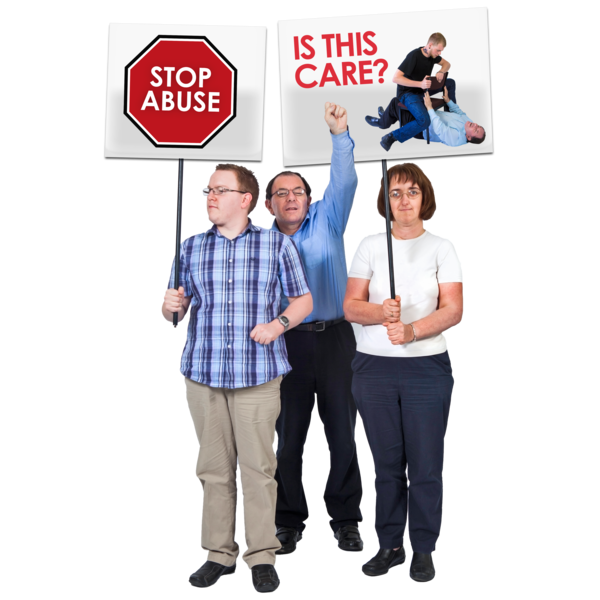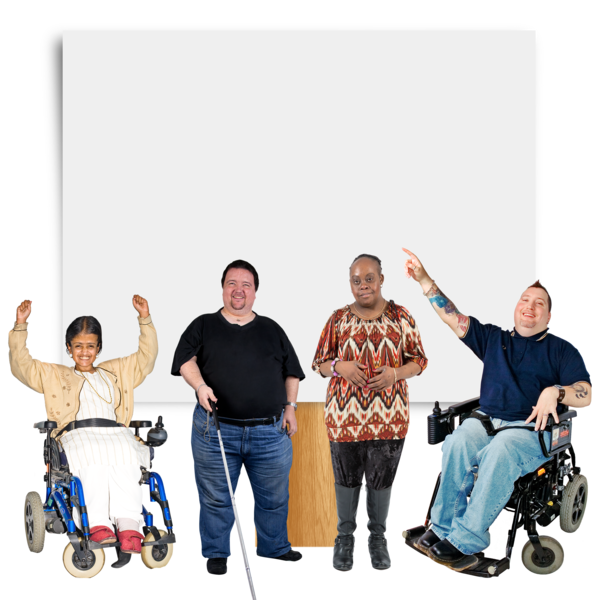Jackie O'Sullivan, Executive Director of Communication,
Advocacy
 Advocacy is when you get support to have your say.
&
Activism
Advocacy is when you get support to have your say.
&
Activism
 Activism is taking action to make change. Going to a
campaign
Activism is taking action to make change. Going to a
campaign
 A campaign is when people work together to try to change something.
event with others, writing letters and speaking up are all ways to take action.
at
learning disability
A campaign is when people work together to try to change something.
event with others, writing letters and speaking up are all ways to take action.
at
learning disability
 A learning disability is to do with the way someone's brain works. It makes it harder for someone to learn, understand or do things.
charity Mencap, said
A learning disability is to do with the way someone's brain works. It makes it harder for someone to learn, understand or do things.
charity Mencap, said
“What about people with a learning disability? One key to independence
Independence means doing things on your own. Making your own choices. is a job but long before COVID many people with a learning disability were shut out of employment
Employment means having a job. . That’s why the government
The Government are the people who run the country. The Government decide how much tax people should pay and how things like the National Health Service (NHS) should work. must make sure its employment schemes are accessible
Accessible means something is easy for people to use or join in with. For example: Accessible writing means the writing is easy to read and understand. and inclusive.
“We know that with the right support people with a learning disability can make fantastic employees and that they have so much to give to help us rebuild after COVID. Many have proved their worth during the pandemic – with some working as the keyworkers we’ve all relied on to keep things moving.
“The pandemic has already thrown the world of work upside down and altered businesses in ways we couldn’t have imagined - it is crucial that people with a learning disability are part of this revolution as we move forwards.”
-ENDS-
For further information or to arrange an
interview
 An interview is a meeting where you talk to someone or a group of people about something. When you have an interview for a job, you have to answer questions and say why you would be good at the job. The person who gives the best answers is offered the job.
with a Mencap
spokesperson
An interview is a meeting where you talk to someone or a group of people about something. When you have an interview for a job, you have to answer questions and say why you would be good at the job. The person who gives the best answers is offered the job.
with a Mencap
spokesperson
 A spokesperson is someone who speaks up about something. They usually speak up on behalf of a group or
organisation
A spokesperson is someone who speaks up about something. They usually speak up on behalf of a group or
organisation
 An organisation are a group of people who work together.
.
or
case study
An organisation are a group of people who work together.
.
or
case study
 A case study is a piece of writing that tells people more information about someone's experience.
, please contact Mencap’s media team on: media@mencap.org.uk. Please note we are currently experiencing issues with our usual press line number (020 7696 5414) and it will be up and running again soon.
A case study is a piece of writing that tells people more information about someone's experience.
, please contact Mencap’s media team on: media@mencap.org.uk. Please note we are currently experiencing issues with our usual press line number (020 7696 5414) and it will be up and running again soon.
Notes to editors:
About Mencap
There are approximately 1.5 million people with a learning disability in the UK. Mencap works to support people with a learning disability, their families and carers by fighting to change laws, improve services and access to
education
 Education is when you learn things. When you fill in a form to get a job, education means you write where you went to school, college or university.
, employment and
leisure
Education is when you learn things. When you fill in a form to get a job, education means you write where you went to school, college or university.
, employment and
leisure
 Leisure is when you have time to do things you enjoy like playing sports or going to the pub.
facilities. Mencap supports thousands of people with a learning disability to live their lives the way they want: www.mencap.org.uk
Leisure is when you have time to do things you enjoy like playing sports or going to the pub.
facilities. Mencap supports thousands of people with a learning disability to live their lives the way they want: www.mencap.org.uk
For advice and information about learning disability and Mencap services in your area, contact Mencap’s Freephone Learning Disability Helpline on 0808 808 1111 (10am-3pm, Monday-Friday) or email helpline@mencap.org.uk.
What is a learning disability?
- A learning disability is a reduced intellectual ability which can cause problems with everyday tasks – for example shopping and cooking, or travelling to new places – which affects someone for their whole life;
- Learning disability is NOT a mental illness or a learning difficulty, such as
dyslexia
 Dyslexia is a learning difficulty. People who have dyslexia can find it hard to read, write and spell.
. Very often the term ‘learning difficulty’ is wrongly used interchangeably with ‘learning disability’;
Dyslexia is a learning difficulty. People who have dyslexia can find it hard to read, write and spell.
. Very often the term ‘learning difficulty’ is wrongly used interchangeably with ‘learning disability’; - People with a learning disability can take longer to learn new things and may need support to develop new skills, understand difficult information and engage with other people. The level of support someone needs is different with every individual. For example, someone with a severe learning disability might need much more support with daily tasks than someone with a mild learning disability.
